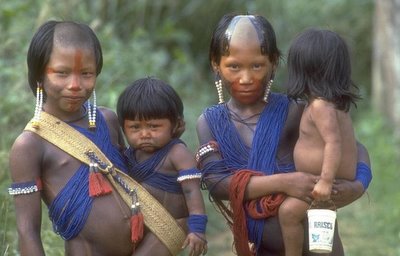Indios in the Peruvian Amazonas lawsuit oil companies

The Achuar people who live in the basin of the Amazonian river Corrientes are in order to become the first aboriginal group in Perù to start a legal action for the damages from extraction of the oil. The list of the actions of civil and legal resistance (brought to the courts) in various countries is growing. This list come from populations (not only aboriginal) damaged by the rich oil escavations in the areas in which they live. The Achuar are 8 thousand people distributed in 31 communities in the northern department of Loreto. Approximately 3-4 thousand of them are those directly damaged by the oil extractions . The well known American Oxy oil company arrived in the aboriginal lands in the now far 70s. Then, in 1996, the PlusPetrol the local branch of the Agentinian PlusPetrol Norte, succeeded in operating in the basins of the rivers Pastaza, Corrientes and Tigre. According to professional reports from the International press agency Inter Press Service (IPS) the pollution is indeed serious. ISP is an organization of documentation and information specialized in the South of the world and that it dedicates a lot of attention to the local enviromentalist activities . The Ministry of the Peruvian Health himself has written up a relationship, rendered public in May 2006, in which for the first time he alerts on the rising levels of lead and cadmium in the blood of the Achuar.
The study, realized in answer to a precise demand from the Federation of the native communities of the river Corrientes (Feconaco), examined blood samples of 199 persons, 74 of them between 2 and 17 years. The levels of cadmium exceeded the acceptable limit of 0.1 milligrams per liter of blood in the 98.6 percent of the cases among children and adolescents inhabitants in the area; in the 97.3% of the cases these levels were even higher than those on record in the smokers (0.2 milligrams) but none of the sample came from a smoker. As far as regards the lead, the level of lead in children and adolescents exceeded the acceptable limit of 10 milligrams per liter of blood in the 66.2% of the cases.
As emphasized by the "Oroya Cannot Wait" report, published by the inter-American Association for the environmental defense (AIDA) and by the Peruvian Society for the environmental rights (SPDA), elevated cadmium concentrations in the blood can provoke lung cancer, kidney diseases, weakening of the boneses and of the immune system, emphysema, chronic bronchitises and cronic hearth problems. The lead hits the nervous system and threatens brain and kidneys. But the PlusPetrol Norte, grabbing hold of to the fact that according to the governmental relationship the concentrations of lead in the water do not exceed acceptable levels, it denies any reponsabilty regarding the concentrations of heavy metals in the blood. The study also specified that because of methodological problems, it was not able to carrying out precise analyses on the levels of other heavy metals like cadmium and copper in the river.
In the 2004 "PlusPetrol Norte", that in that year produced the 54% of the Peruvian oil, was partially acquired (45%) by the oil giant National Petroleum Corporation, the greatest producer in Asia. The representatives of the company said to the IPS, after to having confirmed that the company seriously checks to the limits imposed by law, that it's not possible to conclude that the elevate levels of heavy metals in the blood depends on the contamination of the river because of the oil operations. But the association Racimos de Ungurahui that works for the rights of the Achuar said that in order to estimate in an accurate way the levels of heavy metals in the jungle it would be necessary an analysis of the sediments, because of the heavy metals deposits in the bed of the river and Perù has not jet established, up to not, the maximum values of concentration of heavy metals, hydrocarbons and others in sediments. It's also important to track the level of pollution in the swamps and lakes where the aborigines fish where the traditionally hunted animals by the Achuar have already abandoned the area. After the relationship of the Ministry of the Health, the interetnica Association for the development of the Peruvian Amazzonas (AIDESEP), a regional umbrella-group of 47 aboriginal federations and six organizations, has asked permanent systems of monitoring, the declaration of the state of emergency in the river basin of Corrientes and the cleaning of the lands in charge of the State and the PlusPetrol Norte, together with the usage of much cleaner extractive technologies. The protests and the demands have arrived to the Peruvian Congress which is evaluating them. Meanwhile, the Achuar lawyers prepare legal actions, also against the government, that they accuse of ineptitude.





















































0 Comments:
Post a Comment
<< Home